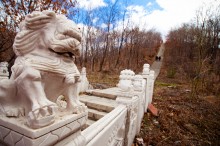Students in CAS400Y: Critical Perspectives on Asian Modernity and EAS466H1: Historiography of North Korea were successful in their application for International Course Module funding from the Faculty of Arts and Science. In May 2014, ten students and Professor Andre Schmid will travel to the Yanbian Korean Autonomous Prefecture in northeast China, the largest settlement of ethnic Koreans outside of the Korean peninsula. This border region, described as North Korea’s “lifeline to the outside world,” is where the majority of the DPRK’s trade takes place, as well as being a site for significant South Korean investment.
The region is home to the Chaoxianzu, ethnic Koreans who initially settled in Yanbian in the 19th century. Yanbian is considered to be one of China’s only truly bicultural societies. However, since the 1990s the area has seen increases in the use of Chinese in everyday speech and the enrollment of Korean children in Chinese language schools. This has happened in conjunction with Chinese economic policies that actively encourage flows of investment, trade, and people from both South and North Korea into China, with many ethnic Koreans moving to South Korea for economic purposes. The module will seek to study the impact of such cultural and economic policies, and ascertain their effects on the shrinking Korean minority population living in China, exploring themes of “integrated” Korean identity, historical memory and migration, and Chinese economic policy towards the DPRK.
Photo: Dunhua Temple Stairs Lion by Sean Byron
